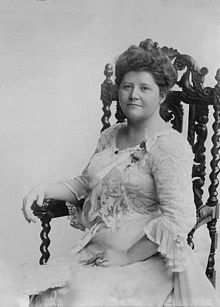Cornelia Cole Fairbanks
Cornelia "Nellie" Cole Fairbanks (* 1852 in Marysville , Ohio ; † October 25, 1913 ) was the wife of Charles W. Fairbanks , who was the 26th Vice President of the United States from 1905 to 1909 . During her husband's tenure, she held the unofficial position of Second Lady of the United States. She was a suffragette leader and a pioneer in politics for American women in the 20th century.
Early life
Cornelia Cole was born to Philander Cole , a state senator from Ohio, and Dorothy Witter. She attended Ohio Wesleyan Female College , where she graduated with an Artium Baccalaureus in 1872 . In 1874 she married Charles Fairbanks, whom she met at Ohio Wesleyan University while working for the school newspaper. They moved to Indiana , where he worked as a lawyer, she supported him in his law firm, and finally she encouraged him to go into politics.
Time in Indianapolis and Washington
She was one of the founders of the Fortnightly Literary Club for Women in Indianapolis , of which she was first president from 1885 to 1888. During this period she also worked in other charities.
While her husband was a US Senator , Cornelia Fairbanks was elected president of the National Society of the Daughters of the American Revolution in 1901 ; she remained in this position for two terms. During her tenure, she helped raise funds for the construction of the Memorial Continental Hall in Washington . She was also active in the George Junior Republic movement. After her husband left office, she toured the world in 1910, including a visit to the court of Edward VII in Great Britain . The clothing she wore for the event is in the Smithsonian Institution .
legacy
Cornelia Fairbanks died in 1913. She is buried next to her husband († 1918) in Crown Hill Cemetery in Indianapolis. She was seen as a powerfully progressive, behind the political scene, and paved the way for women in leadership positions in the United States. She was considered the equivalent of the female president of the United States through her leadership role in the Daughters of the American Revolution and helped establish the second Women's Club in the United States in Indianapolis through her work on the national board of the General Federation of Women's Clubs . She was considered feminine, but was a suffragette and advocate of women's rights. She is remembered as pioneering politics for American women in the 20th and 21st centuries. She was one of the most famous women in the United States in her day and, like her husband, is considered a shrewd politician.
Fairbanks was a champion of Protestant Christianity and supported missionary work. In 1899 she organized a trip to Alaska for the British and American Joint High Commission . Fairbanks , Alaska's second largest city, was named so shortly afterwards in honor of her husband. At her husband's request, the Cornelia Cole Fairbanks Trust Fund was set up to set up a treatment center for alcohol addicts. The Indianapolis center was named The Cole Cornelia Fairbanks Memorial Home .
marriage and family
Cornelia and Charles had four sons and one daughter:
- Robert Fairbanks visiting Yale
- Richard M. Fairbanks, who attended Yale and served as a captain in World War I.
- Adelaide Fairbanks, with Dr. Horace Allen married
- Warren Charles Fairbanks
- Frederick Cole Fairbanks
Web links
| personal data | |
|---|---|
| SURNAME | Fairbanks, Cornelia Cole |
| ALTERNATIVE NAMES | Fairbanks, Nellie |
| BRIEF DESCRIPTION | American second lady |
| DATE OF BIRTH | 1852 |
| PLACE OF BIRTH | Marysville , Ohio |
| DATE OF DEATH | October 25, 1913 |
